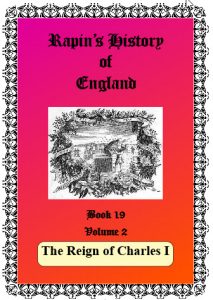CHARLES I. SON AND SUCCESSOR OF JAMES I. was tinctured from his infancy with the principles concerning the regal authority and prerogative Royal, which were so much improved by the deceased King during his life. He had the same favourite, the same council, the same ministers, and all the places at court, and in the Kingdom, continued in the hands of the Duke of Buckingham’s creatures.
Buckingham is Favourite to The New King
So, there was nothing new but the King’s person. Charles’s journey to Spain had so endeared the Duke of Buckingham to him, that King James’s affection for that favourite was nothing, as I may say, in comparison of the new King’s. It was thought, and it is
not unlikely, if James had lived, he would have discarded the Duke, with whom he was displeased for several reasons:–
1. Because of the journey to Spain, of which he was the sole adviser, and which had exposed the King to the censure of all Europe.
2. On account of the breach of the Spanish match without any just cause.
3. For the Duke’s engaging him, as it were against his will, to break with Spain.
4. For causing, by the Prince’s credit, and his interest with the Parliament, the Lord Treasurer Middlesex to be condemned, in spite of the King himself, who did his utmost to save him, and even sued to the Prince and Duke for his pardon, without being able to obtain it.
The Duke is Suspected of King James I Death
Thus James died very seasonably, for the favourite, who, probably, to support himself, must have set the Prince at variance with his father, which might have had terrible consequences. This raised strong suspicions of the Duke, which were farther confirmed by his presuming to apply a plaster to the King’s side, and giving him, with his own hand, a potion to drink, without the advice of his physicians.
Indeed, the Duke could not be directly accused of hastening the King his benefactor’s death, by the remedies he gave him. But when the time and circumstances of this unexpected death, caused by a tertian ague, not usually very dangerous in the spring, were jointly considered, with the embarrassments it delivered the favourite from, and the advantages it procured him, it was difficult not to suspect him.
And yet, on the other hand, when the new King was seen to have an entire affection for the Duke, it could not be imagined that he doubted his innocence in that respect. However this be, this Duke of Buckingham was the son’s favourite, as he had been the father’s, with still greater power and credit than he had enjoyed in the foregoing reign.
